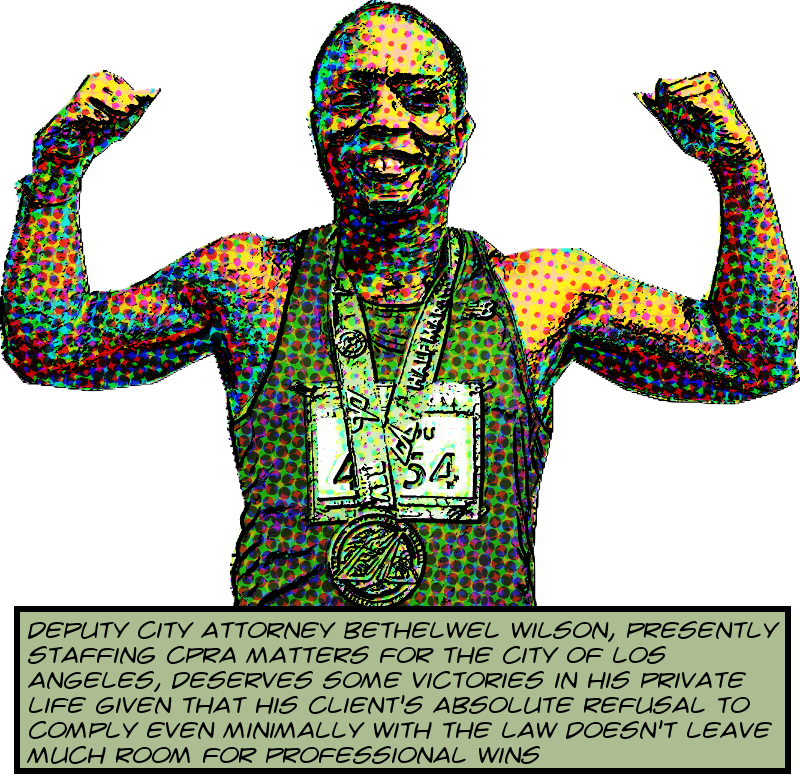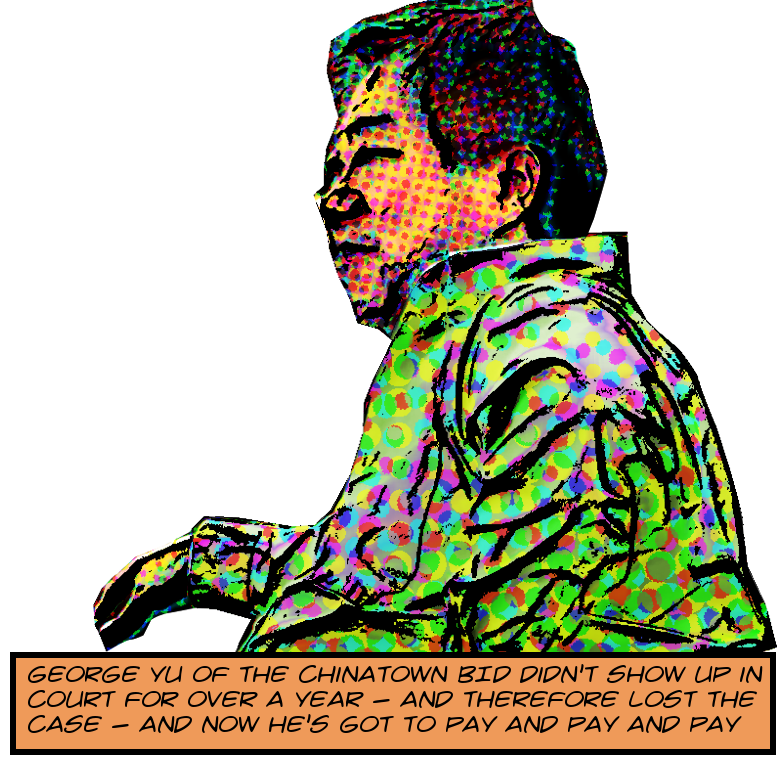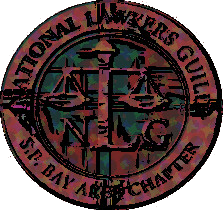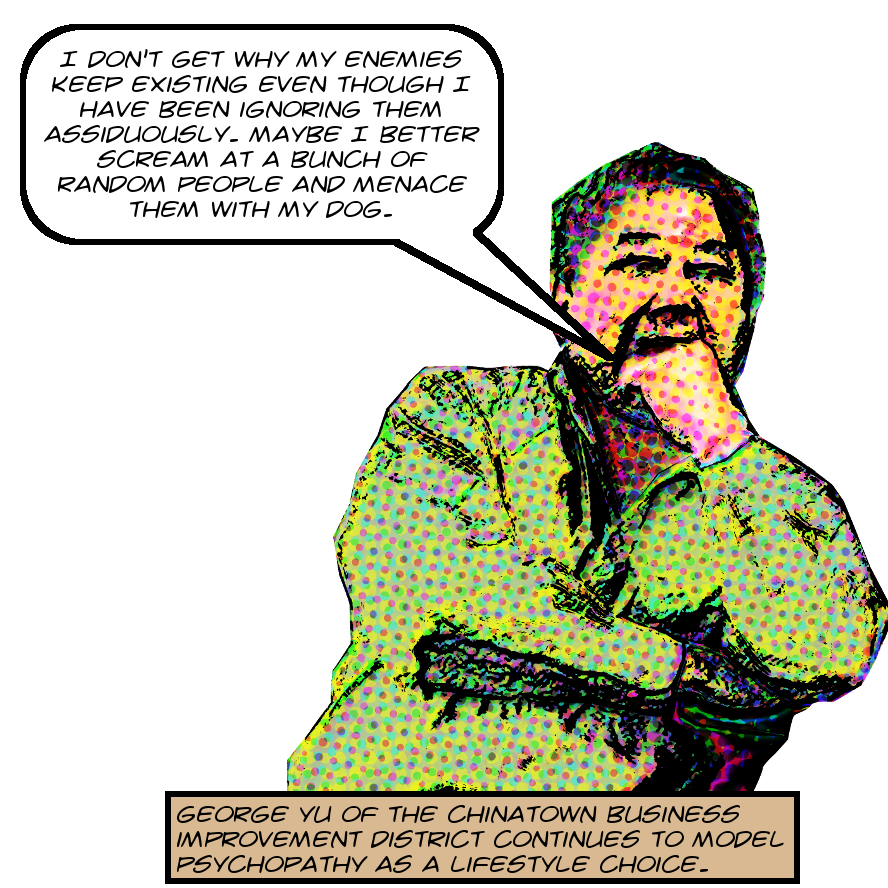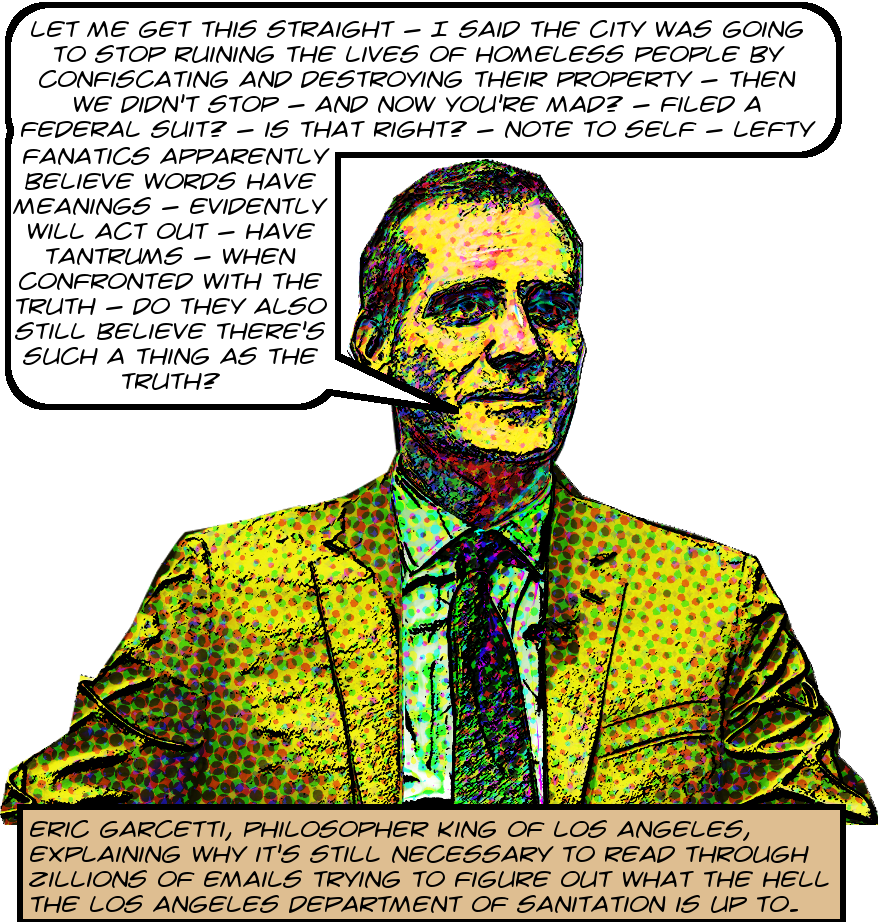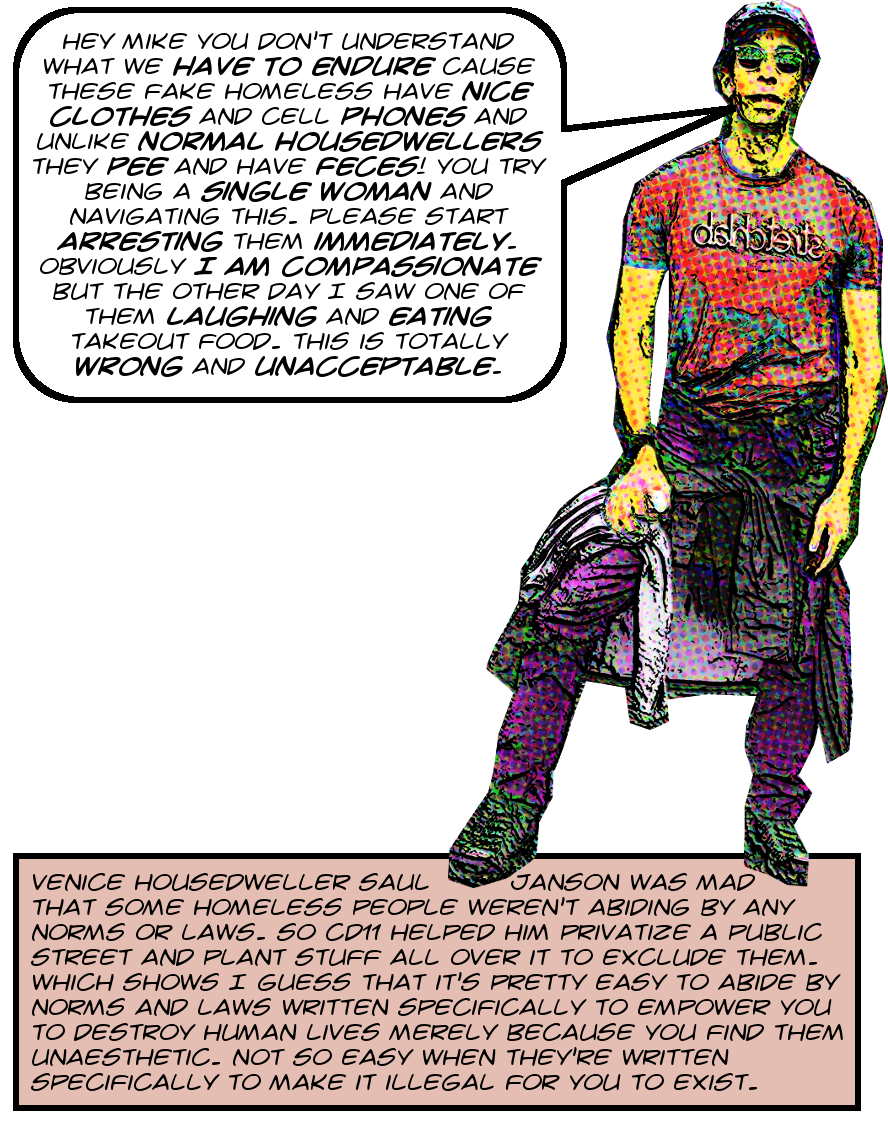 I’ve been spending some time looking into the ways in which City Council offices materially support housedweller aggression against homeless residents of Los Angeles, including especially by facilitating illegal hostile architecture. Venice is one of the main theaters in which this drama is currently being performed, what with the proliferation of illegal planters and other, more idiosyncratic projects like for instance the Frederick Passageway, just west of the Penmar Golf Course. So naturally I’m spending a great deal of time sending requests to CD11 under the California Public Records Act.
I’ve been spending some time looking into the ways in which City Council offices materially support housedweller aggression against homeless residents of Los Angeles, including especially by facilitating illegal hostile architecture. Venice is one of the main theaters in which this drama is currently being performed, what with the proliferation of illegal planters and other, more idiosyncratic projects like for instance the Frederick Passageway, just west of the Penmar Golf Course. So naturally I’m spending a great deal of time sending requests to CD11 under the California Public Records Act.
And for a long time they completely ignored me, but then, by pure good fortune, in response to a request to LAPD, I received a stunning and unexpected email conversation between (now former) CD11 field deputy Taylor Bazley and various worthies proving conclusively that, despite many, many explicit denials from Mike Bonin’s flacks that there was any coordination at all between Bonin’s office and the outlaw planter-placers, Bazley was in fact directly involved in the process, even to the extent of calling in a sweep of a homeless encampment specifically so that illegal planters could be placed.
This discovery magnified the importance of the emails I’d requested from CD11 to the point where we all put on our hustle-hats and filed a petition splickety splat! And, as it turns out the City is wont to do, they pretty quickly started handing over records. You can take a look at the first batch here on Archive.Org. And these are all interesting, certainly, but the most interesting of all is this spool of emails between Taylor Bazley and various folks about the Frederick Passageway. There are two threads to the conversation here.
First there’s Bazley coordinating with angry housedwellers to ruin this public passageway by planting crap all over it to thwart the efforts of homeless human beings to survive, mostly because the housedwellers find them unaesthetic. Some of the identities of these housedwellers are known. For instance, there is ringleader Saul C. Janson, who claims to be some kind of lawyer. You can reach Saul at sacoja@aol.com and his phone number seems to be (310) 452-7978.
There is also self-proclaimed coffee confectioner Allison Altschuler, who can be contacted at allisonaltschuler@gmail.com. And shockingly untalented and shockingly well-known cartoonist Rick Detorie, who you can email at rdetorie@yahoo.com. Last but never ever ever least is zillionaire NBC news producer Richard Adams. Get in touch with Adams at Richard.Adams@nbcuni.com or via phone at his office, (818) 684-2873, or, for that more direct and personal touch, on his cell at (818) 391-7508.
Bazley spends months, years, encouraging them. He suggests places they can find funding for their aggressive anti-human project. Listens sympathetically to their crazed rants. Really gets into the details of hostile landscaping, e.g. suggesting that they avoid shade trees because the homeless will enjoy sitting under them. Accompanies them in person to City offices to help them obtain permits. Helps them collect astroturf letters of support for submission to the Bureau of Engineering, telling them they don’t have to be sincere or even have much content as the only purpose is ass-covering in the event that someone sues the City.
And so on, all done in the inimitably sycophantic and cynical Bazleyian manner. This material is an important addition to the history of anti-homeless landscaping in Venice. To date we didn’t really know who was behind the appropriation and destruction of this public street, and we certainly did not know the extent to which Bazley and CD11 were involved in coordinating it.
But in addition to that conversation, which is new and important but at the same time fairly predictable, familiar in tone and content if not in specifics, there are also a bunch of emails between Bazley, Mike Bonin himself, who repeatedly orders Bazley to cater to the whims of the housedwellers, and Debbie Dyner Harris, at that time a district director for Bonin, also ordering Bazley to please get to work and please please the housedwellers.
This is a side of the process we very rarely get to see. Councilmembers either only send very few emails or else their offices routinely and illegally withhold them. And these few emails are terse. The staff knows what to do, they don’t need to be told explicitly. Records, after all, will end up on the Internet. Best, then, not to generate any. This material, while actually less sensational than the other, is equally if not more important for shining light on the internal processes of Bonin’s office.
Another fact, revealed for the first time by these newly released records, is that the housedwellers were looking to this project not just as a way to exclude some unaesthetic human beings by installing plants on a public street. They were actually looking to literally privatize the street by annexing parts of it and adjoining them to their lots, thereby increasing their property values. This unexpected but ultimately not surprising development demonstrates in a pretty stark way that most if not all anti-homeless housedweller rage is actually about money.
Usually, possibly, the financial gains from hostile architecture are framed as about how aesthetics and perceptions of homeless neighbors affect property values but, at least in this case, it’s about actual annexation of publicly owned land. Thus spake Taylor Bazley: “a lot of the adjacent property owners are looking to assume ten more feet of property through the process of street vacation.” Taylor doesn’t go along with this plan, but not because he sees anything wrong with it. It’s just, he assures his boss, that it takes too long.
But as much as is revealed by these emails, one of the central mysteries remains unexplained. You’ll see, if you read on to the transcripts below, that the complaints that initiated the multi-year process of installing hostile landscaping on the Frederick Passageway are so stupid as to be incoherent. Saul Janson is angry, e.g., that the homeless people in the encampment laugh, eat food from takeout containers, own cell phones, and so on. He compares homeless people’s possessions to cancer, saying that their “stuff metastasizes daily”>.
He thinks single women are more particularly vulnerable to the unspecified predations of the homeless than, I guess, men and non-single women? The man is a slime-oozing braindead ball of enraged emotional putrefaction, certainly no one to be taken seriously. Oh, I forgot to mention! Janson and his neighbors “are mostly caring and socially responsible people.” Just ask them! If he weren’t a housedweller the best he could hope for out of City officials would be to be ignored. The worst would involve throwing away his tent or his insulin, tasing him, jailing him, 5150ing him into oblivion, leaving him to die on the pavement in the rain.
But none of that happens here. Instead of mocking and ignoring him, Bonin writes to Bazley and Dyner Harris to tell them to take care of the guy’s concerns. We’ve seen this exact phenomenon in CD13, as well as in CD11 with a whole different Klown Kar Krew, so it’s not isolated. What I don’t understand, what I despair of understanding, is why Councilmembers are so solicitous of these housedwellers. They’re not necessarily big donors. For instance, according to the Ethics Commission, none of Janson, Altschuler, or Adams have ever given a penny to Bonin.
They’re not influential, they’re not going to sway an election. And yet the CMs listen to them, sweep encampments, disrupt lives, at their request. Maybe it’s because they’re asking for something the CMs want to do anyway and so provide political cover? I legitimately don’t get it and nothing in these emails gives even a clue. Perhaps some day this premiere open question will be solved! Meanwhile, read on for transcribed selections with some commentary and links!
Continue reading The True History Of The Frederick Passageway Anti-Homeless Hostile Landscaping Project — Guided By Angry Self-Proclaimed Lawyer And Housedweller Saul Janson — And Revanchist Housedwelling Coffee Confectioner Allison Altschuler — And Housedwelling Zillionaire NBC News Producer Richard Adams — (Not The Guy With The Damn Bunnies But A Different One) — And Famous But Shockingly Untalented Cartoonist Rick Detorie — Assisted At Every Stage By Freaky Little Lying Former CD11 Field Deputy Taylor Bazley — Who Explicitly Told Jansen To Exclude Shade Trees Because Homeless People Like Sitting Under Them — And Told Altschuler To Collect Bullshit CYA Letters From Neighbors In Case The City Got Sued — All Of This Done At The Express Orders Of Little Man Behind The Curtain Mike Bonin — Revealed In Emails Released In Response To My CPRA Lawsuit Against CD11 — And This Is Just The Start Of The Releases, Friends! →
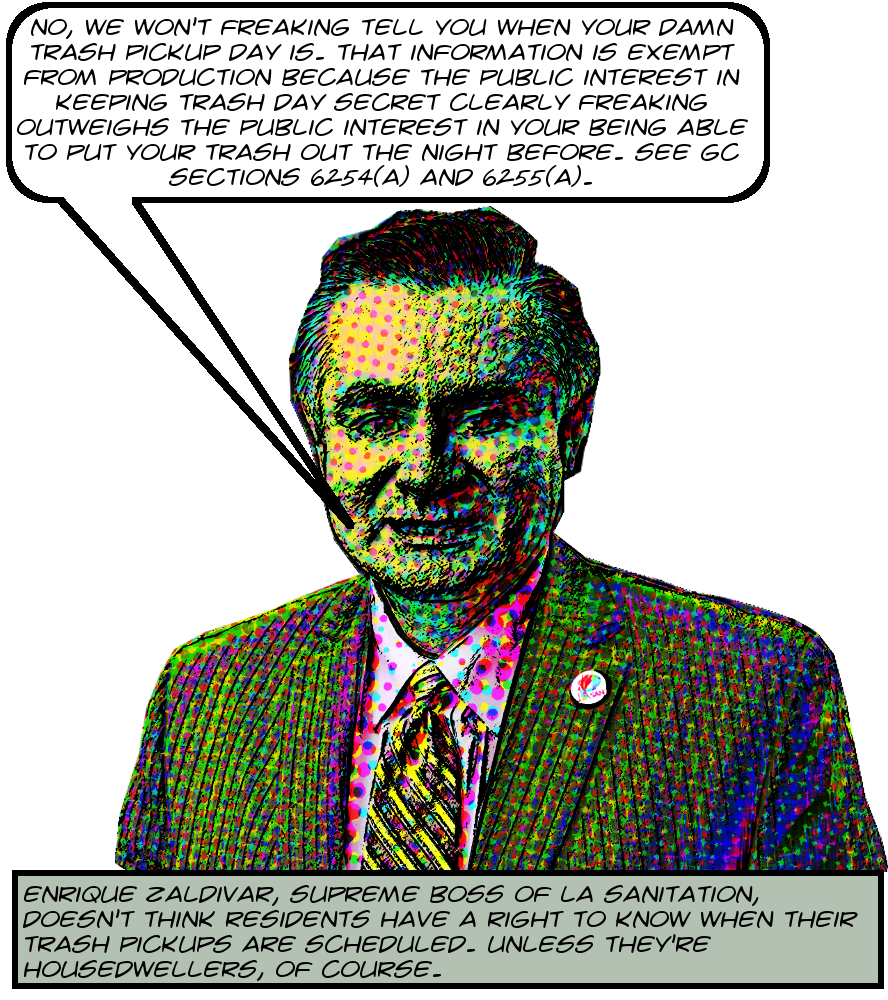 I have been trying to use the California Public Records Act to get advance notice of homeless encampment sweeps for three years now. After a few months of arguing with LA Sanitation, in 2016 I actually managed to get a schedule one day in advance. I went out and filmed the whole thing, but then the City went back into full metal obstructionism and refused to hand over another advance schedule.
I have been trying to use the California Public Records Act to get advance notice of homeless encampment sweeps for three years now. After a few months of arguing with LA Sanitation, in 2016 I actually managed to get a schedule one day in advance. I went out and filmed the whole thing, but then the City went back into full metal obstructionism and refused to hand over another advance schedule. 
